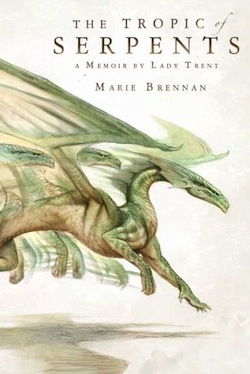A Natural History of Dragons: a memoir by Lady Trent opened a new series by Marie Brennan. In it, Isabella, a gentlewoman from the nation of Scirling—which bears a passing resemblance to Victorian England—begins the tale of how she became the foremost dragon naturalist of her age. The voice is a retrospective one, that of a mature woman reflecting on the experiences of her youth, and it is this choice of perspective that lends Natural History a great deal of its appeal.
The Tropic of Serpents shares Natural History’s voice, and—to my mind, at least—exceeds its appeal.
Isabella has still not yet become Lady Trent, but she is both a mother and a widow. The Tropic of Serpents opens three years after the events of Natural History, with Isabella engaged in arranging a lengthy research expedition to Eriga. Eriga is a tropical nation—it seems to be a West Africa analogue, much as Scirling is an analogue of Victorian England—who is presently receiving military aid from Scirling, since its neighbours are threatening invasion. The agreements between Eriga and Scirling disproportionately favour Scirling, and Isabella is to walk into a politically complicated situation when she finally arrives in Eriga, but that awaits later points in the novel. The beginning is concerned with familial disapproval and academic espionage. And arranging matters so that Isabella’s friend, companion, and colleague Natalie can escape her family’s resolve to marry her off in favour of joining the expedition.
Once in Eriga, Isabella and her colleagues encounter local hospitality and international politics. While Isabella is glad to investigate the native draconic species, the forest-dwelling tree-snakes and the grass-snakes of the savannah, she also wants to collect information on Moulish swamp-wyrms, which come from the dangerous and nearly impenetrable swamp of Mouleen. International politics and academic research come together when the oba of Eriga agrees to facilitate their journey to the swamp—but requests, or rather commands, Isabella’s expedition to bring him back swamp-wyrm eggs. Before matters are entirely concluded, Isabella will have foiled an invasion of Eriga and been accused of treason to Scirling—not to mention having jumped off the side of a very high waterfall.
Brennan’s background in anthropology, and the degree of research she did to make the equatorial places Isabella visits seem zoologically and geographically plausible, and their societies distinct, is apparent here. Like A Natural History of Dragons, The Tropic of Serpents is in part a fantasy travelogue, a guided tour of a world aslant from our own. It is also, in its way, a very science-fictional fantasy novel: it is in love with the idea of discovery, of knowing the world, of knowledge for the sake of knowledge as well as for its fruits. Isabella’s particular passion may be dragons, but the narrative extends this attitude to all kinds of knowledge and discovery. That delights me.
It also delights me that The Tropic of Serpents touches on the problems faced by lady adventurers. Like, for example, menstruation. And in Isabella’s case, society’s disapproval of her choice to leave her three-year-old son in the care of relatives in order to pursue her life’s work. Isabella evinces a complicated attitude towards motherhood, and rightly points out the double standard of a society that would have a widow abandon her own work in favour of devoting her life to her child, while it would expect nothing of the kind when it came to a widower. This is a topic rarely brought into perspective in the fantasy genre, and that makes me doubly glad to see Brennan treat it with nuance here.
Brennan’s pace is measured. One might even say leisurely: but her touch with character and the strength of Isabella’s voice makes for compelling reading. The Tropic of Serpents is full of vivid turns of phrase, and especially with regard to the sections set within the swamp of Mouleen, the narrative environment is a palpable presence: humid, wet, insect-ridden, full of potential hazard. And once again Todd Lockwood has contributed not only striking cover art, but interior illustrations as well. These black-and-white sketches add an extra layer of enjoyment to what is already a delightful book: an extra edge of verisimilitude to the a memoir by Lady Trent of The Tropic of Serpents’ subtitle.
The Tropic of Serpents is a thoroughly enjoyable book. I recommend it without hesitation, and hope that Brennan has the opportunity to bring us many more reminiscences from Lady Trent’s extraordinary life.
The Tropic of Serpents is available March 4th from Tor Books.
Liz Bourke is a cranky person who reads books. Her blog. Her Twitter.










